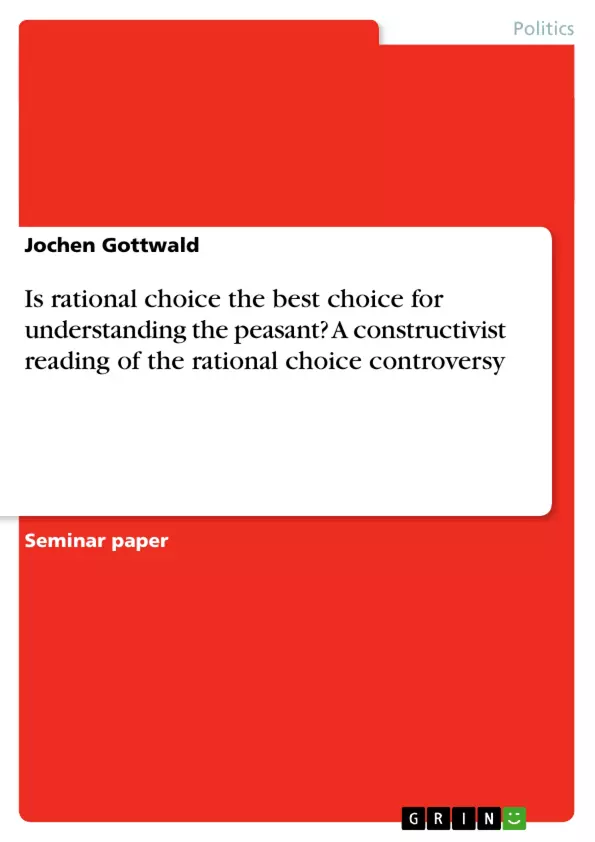In this essay I will try on the one hand to critically examine the reservations held against rational choice by many anthropologists, by offering a constructivist analysis of the debate, on the other hand to help bridging the gap between constructivism and rational choice theory, which is, in my eyes, unnecessarily kept wide by scholars of both disciplines, what led to the emergence of flawed models of rationality like ′bounded rationality′ in the struggle of rational choice scholars to defend their assumptions. By arguing that models of rational choice are a legitimate variety in the broader context of construed attempts to explain social phenomena, I will show that it should be possible to hypothesize political action by rational choice models without curtailing the meaning of rationality. As empirical variable I chose the political behavior of the peasantry in Indian villages, as the peasant seems to be the anthropologists′ stereotype for culture′s dominance over actors′ preferences. For that reason I will mainly use Mitra′s article "Ballot-Box and Local Power: Elections in an Indian Village" (Mitra 1999, fn. 12), to highlight the possible synergies of constructivism and rational choice theory on the critical edges of their approaches. Nonetheless it will be necessary to make a quick excursion into Kant′s moral philosophy to expose the obscurity in our modern concept of rationality, which I consider responsible for the current dispute about the legitimacy of rational choice theory.
Inhaltsverzeichnis (Table of Contents)
- Introduction
- General reservations against rational choice
- The response of rational choice scholars
- A constructivist reading of the debate
- the meaning of rationality and the problem of individual choice
- the meaning of culture and the problem of collective choice
- the meaning of science
- The use of combined effort: a case study of the peasantry
- Conclusion
Zielsetzung und Themenschwerpunkte (Objectives and Key Themes)
This essay aims to critically examine the reservations held against rational choice theory by anthropologists and to bridge the gap between constructivism and rational choice theory. It argues that models of rational choice are a legitimate variety in the broader context of construed attempts to explain social phenomena and that it should be possible to hypothesize political action by rational choice models without curtailing the meaning of rationality.
- The critiques of rational choice theory by anthropologists
- The response of rational choice scholars to these critiques
- A constructivist analysis of the debate between rational choice and constructivism
- The application of combined approaches to understand the political behavior of the peasantry
- The historical development of the meaning of rationality in the Western context
Zusammenfassung der Kapitel (Chapter Summaries)
The first chapter provides an overview of the various critiques held against rational choice theory and the response of rational choice scholars. It examines the arguments of Pauline Peters, who critiques rational choice theory for its neoclassical approach and its perceived failure to account for cultural context and moral behavior. The chapter also discusses the work of Donald Green and Ian Shapiro, who focus on the empirical and methodological shortcomings of rational choice theory.
The second chapter presents a constructivist analysis of the debate between rational choice and constructivism. It argues that the misunderstanding between the two perspectives stems from their differing conceptions of rationality, culture, and science. The chapter traces the history of the meaning of rationality in the Western context to shed light on the origins of this debate.
The third chapter presents a case study of the peasantry in Indian villages, demonstrating the potential synergies of constructivism and rational choice theory. It focuses on Mitra's article "Ballot-Box and Local Power: Elections in an Indian Village" (Mitra 1999, fn. 12) to highlight the possible benefits of combining both perspectives.
Schlüsselwörter (Keywords)
The main keywords and focus topics of this essay include rational choice theory, constructivism, rationality, culture, political behavior, peasantry, Indian villages, anthropology, and moral philosophy. The essay examines the debate between these two theoretical approaches, explores their differing conceptions of rationality and culture, and argues for the potential benefits of integrating both perspectives to understand social phenomena, particularly the political behavior of the peasantry.
Frequently Asked Questions
What is the main argument of this essay regarding Rational Choice?
The essay argues that Rational Choice models are a legitimate way to explain social phenomena when integrated with constructivist perspectives.
Why do anthropologists often criticize Rational Choice theory?
Many believe it fails to account for cultural context and moral behavior, often viewing it as a flawed neoclassical approach.
How does the essay use Indian peasants as a case study?
It analyzes the political behavior of peasants in Indian villages to show that their choices can be both rational and culturally grounded.
What is 'bounded rationality'?
It is a model used by scholars to defend Rational Choice by assuming that human rationality is limited by information and cognitive capacity.
What role does Kant's philosophy play in the discussion?
The essay revisits Kant to expose obscurities in the modern concept of rationality that fuel the current dispute between constructivism and Rational Choice.
- Citar trabajo
- Jochen Gottwald (Autor), 2003, Is rational choice the best choice for understanding the peasant? A constructivist reading of the rational choice controversy, Múnich, GRIN Verlag, https://www.grin.com/document/18802



